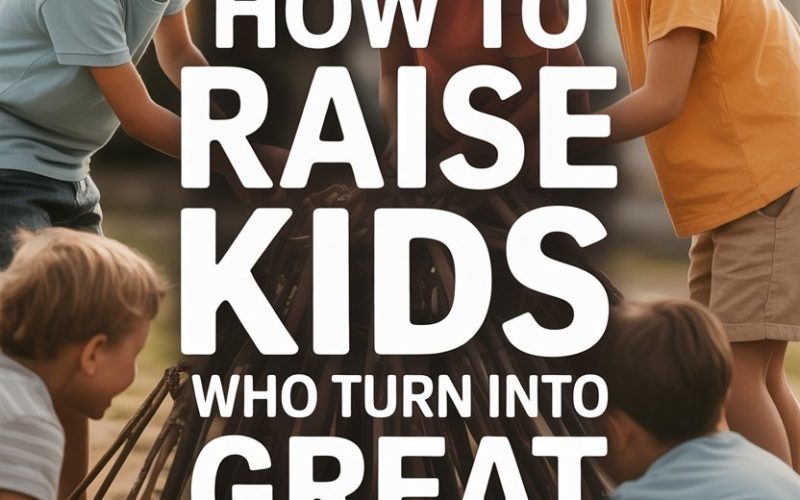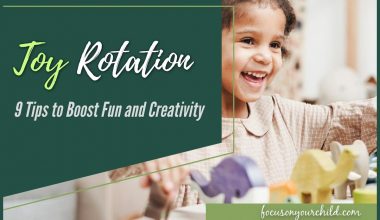Raising stellar humans is the secret dream hiding in every parent’s heart—right between “let them sleep through the night” and “please stop licking the dog.”
It sounds daunting, especially when you’re balancing work, laundry, and that ever-present urge to just hide in the pantry with the good biscuits.
But there’s good news: raising good humans doesn’t require a PhD in parenting or a colour-coded chore chart (unless you just really like stationary). It’s a collection of small, consistent moments done with love and a dash of patience.
Here’s how to plant the seeds for compassion, resilience, and all-around decency.
Model Kindness Like It’s Your Job
Children are master imitators, and you’re their favourite show.
When you say “thank you” to the postie, apologise when you’re wrong, or help someone with their pram at the shops, your child is soaking it all up. The best way for kids to learn empathy is to witness it in action.
According to Harvard University’s Making Caring Common Project, consistently showing kindness in your everyday life is far more influential than any lecture.
Slip small acts of kindness into your routine. Hold the door open, send a message to a mate who’s having a rough week, let someone merge in traffic (even if it physically hurts).
Then, talk about these things with your child. “Did you see how happy that made her?” or “I made a mistake and said sorry. Everyone messes up sometimes.”
If you mess up? Apologise. Kids need to see that grownups aren’t perfect, but try to make things right—preferably before the entire street hears about Mummy’s outburst at the bin collection.
Teach Them to Name (and Accept) Their Feelings
Feelings are a bit like glitter—once they spill out, they’re everywhere and impossible to ignore.
Great humans don’t just bury their emotions or shout them into cushions (although cushions are brilliant for a cheeky scream).
Research from Yale’s Center for Emotional Intelligence shows that kids who can identify and share their feelings cope better with stress and build stronger relationships.
Start by helping your child label emotions: “Looks like you’re frustrated because your tower fell down.” Avoid the urge to distract or ‘fix’ immediately. Instead, sit with them in the yuck of it.
This teaches that all feelings—even the sticky, shouty ones—are valid.
When your child sees you naming your feelings—“I’m tired and a bit snappy tonight, I think I need a bit of quiet”—they learn emotional honesty is safe.
Praise the Effort, Not Just the Outcome
It’s tempting to clap wildly any time your child brings home a gold star, but the secret sauce is celebrating the trying, not just the triumph.
Research from psychologist Carol Dweck’s work on growth mindset reveals that kids praised for effort rather than innate ability are more likely to persevere through challenges and bounce back from setbacks.
Swap “You’re so smart!” for “You worked really hard on that.” Notice the grit, the persistence, the way they kept going even when frustrated.
These little nudges build resilience—the kind that lasts long after the sticker charts are forgotten.
And if they fail? That’s worth a high-five too. Failure means they were brave enough to try.
Set Boundaries Like You Mean It
Kids crave limits, even if they act like bedtime is a human rights violation.
Boundaries aren’t about being strict for the sake of it. They’re an act of love, scaffolding your child’s sense of safety in a wobbly world.
A 2014 study in the Journal of Child Psychology and Psychiatry found that clear, consistent boundaries are linked to better self-regulation and fewer “I’m going to throw this broccoli at the wall” moments.
Boundaries work best when delivered with warmth and certainty. “You can be angry, but you can’t hit.” “Sweets are for after dinner.” “Screens go off at 7.”
Yes, you will need to enforce them more than once. Possibly a thousand times. That’s normal. Consistency is what matters.
Also: don’t be afraid to apologise if you occasionally get it wrong. Everyone’s patience runs out sometimes.
Teach Gratitude (Without a Lecture)
Gratitude isn’t just for Instagram captions—turns out, it’s linked to happiness, empathy, and even better sleep, according to a study published in the Journal of School Psychology.
Tiny gratitude rituals can make a big difference. Try sharing one thing you’re grateful for at dinner (and yes, “dessert” totally counts). Write thank-you notes together.
Acknowledge when someone in the family does something thoughtful, even if it’s just passing the remote without making a fuss about it.
If your child grumbles about chores, reframe them. “We get to fold our clothes because we have warm things to wear.” Over time, this rewiring shapes brains to spot the good stuff—and that’s a skill they’ll carry for life.
Encourage Curiosity and Making Mistakes
Curiosity is the root of all learning, and mistakes are the fertiliser.
Encourage your kids to ask questions—about everything. “Why is the sky blue?” “Why do people get grumpy?” “Why can’t I have cake for breakfast?”
Give honest answers when you can, and admit when you don’t know. Google is your friend, but it’s also okay to say, “Let’s find out together.”
Celebrate mistakes as learning opportunities. When something goes pear-shaped, talk through what happened and what they might try next time.
This helps kids develop problem-solving skills and confidence—much more useful than knowing all the answers.
Make Respect Non-Negotiable
Respect doesn’t mean blind obedience. It’s about treating people (and yourself) like they matter.
Model respect by speaking kindly to your children—even when you’re repeating yourself for the millionth time. Expect the same in return.
Remind them that everyone deserves respect, especially when feelings run high. This includes siblings, teachers, neighbours, and, yes, the kid who always cheats at tag.
If your child messes up, help them make amends. A sincere apology or a thoughtful gesture says more than any forced “I’m sorry” ever could.
Encourage Independence in Manageable Bites
Every parent has that urge to swoop in and rescue—but kids need to flex their independence muscles, even if it means your kitchen ends up looking like a flour bomb went off.
Give your child small, manageable responsibilities. Let them pick out their own clothes (even if it’s polka dots with plaid), make their own snack, or walk the dog with you.
According to a study from the University of Mississippi, these moments build self-confidence and boost problem-solving skills.
Guide, don’t helicopter. If mistakes happen, resist the urge to fix.
Instead, ask, “What do you think we should do now?” Watching a child solve their own problems (or at least attempt to) is equal parts terrifying and brilliant.
Foster Friendships and Social Skills
Turns out, being able to share a biscuit or wait your turn in a game is just as important as algebra.
Help your child practise social skills by hosting playdates, joining sports clubs, or simply playing family board games (with plenty of reminders that flipping the board is not a valid strategy).
Discuss what it means to be a good friend—listening, sharing, sticking up for someone, and saying sorry when you’ve mucked up.
Model healthy conflict resolution. Let your child see you work through disagreements with your partner or friends.
According to a report from the Australian Institute of Family Studies, strong social skills are linked to wellbeing and success later in life.
Prioritise Family Rituals and Meaningful Moments
Life gets busy. Schedules fill up. But those small, quirky family rituals—Friday night pizza, pancake Sundays, reading together before bed—are the glue that helps kids feel safe and connected.
You don’t need expensive holidays or elaborate outings. Five minutes snuggling on the sofa, a silly handshake before school, or a special song at bedtime can be just as powerful.
Research from The Family Dinner Project shows that regular family meals are linked to everything from better grades to lower rates of risky behaviour.
These moments give kids a sense of belonging—and a reason to come home for a cuppa when they’re grown.
When the Wheels Fall Off
Raising great humans isn’t about never losing your cool or always knowing the right answer.
There will be days when you shout, everyone eats cereal for dinner, and the only thing your child seems to have learned is how to push every single one of your buttons.
Those days? They’re part of the deal.
The good news: you don’t have to be perfect to raise kind, capable kids. You just have to show up, say sorry when you muck up, and keep loving them—no matter what.
And if all else fails, remember: they’re watching how you handle the mess, too.
That’s where the real magic happens.




